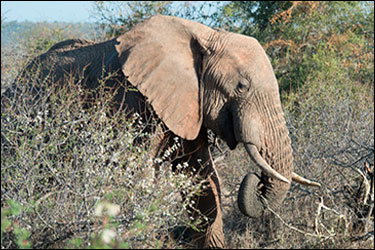Kind Rescuers Save Wild Elephant From Poaching Attempt
Three Elephants With Looming Legal Battles... Will You Help?
California State Senate Votes to Ban Bullhooks. The California State Senate voted 28 to eight to ban bullhook use with elephants, making it the first state to enact such a ban. A bullhook is a long rod with a sharp metal hook at the top. It’s one of the weapons used by circuses to beat elephants in the name of “training” in order to coerce them into performing tricks.California’s bullhook ban is now in the hands of Gov. Jerry Brown, whose signature can turn the bill into law. When this historic ban goes into effect in 2018, no elephant in California will ever again be beaten, hooked, jabbed, or threatened with these weapons, or the wielder will pay a price.

What You Can Do

 What is the U.S. doing about the illegal ivory trade?
What is the U.S. doing about the illegal ivory trade?

Wild African elephants are teetering dangerously on the brink of extinction. They are becoming the unwilling victims of an unfortunate human political and economic game that has led to an increase in the demand for black market ivory. The going rate for ivory is currently about $3,000 per kilo and each adult elephant tusk weighs roughly five kilos. This puts a $30,000 price tag on the head of every elephant in Africa! With political corruption running rampant and many Africans living in abject poverty, these inflated prices have the mass slaughter of Africa’s elephants.
Each year there are approximately 35,000 elephants hunted down and brutally slaughtered for their ivory. This translates to roughly one hundred elephants killed each day. That means that in the time that it takes most people to shower each morning, an elephant has lost their life.
This bloody slaughter also wreaks havoc on the remaining live elephants and those who are not killed but are often maimed or injured as they flee from their attackers. This was the case in this video, which was filmed on the Maasai Mara Wildlife Reserve in Kenya.
The rangers, who often risk their lives fighting illegal poaching, tracked an injured elephant into the bush. Luckily, the skilled vets are able to treat the animal and before long it is as good as new, happily returning to its herd. This elephant’s story was a happy ending, thanks to the help of a few kind humans, proving once again that it is possible for all of us to get along.
Three Elephants With Looming Legal Battles... Will You Help?
Chanchal's Story: In 2012, when Chanchal was 16 years old, she and another elephant were hit by a speeding truck. Tragically, her companion was killed instantly in the hit and run, and poor Chanchal was severely injured. In addition, she was starving and undernourished. Her owners were arrested for negligence, and Chanchal came to live in our rescue center, where she is thriving despite having some injuries she'll never be able to fully recover from.
Upcoming Legal Battle: While we have won several cases on Chanchal's behalf, her former owners have not given up and seem determined to get her back.
Help us keep Chanchal free by donating to the Elephant Legal Fund today!
Laxmi's Story: When she was rescued in 2013, Laxmi was morbidly obese and had medical issues resulting from years of neglect and mistreatment. We have worked hard to help Laxmi recover from the many problems that were ailing her. Sadly, she was abused so profoundly that some of her medical conditions will never heal. Still, she is happy with us and has friends and a good life.
Ongoing Legal Battle: Laxmi's previous owners are still trying to get her back! They have found a loophole with the court orders that were issued to move her to our facility and they are using it to try and get her returned to them. We have been fighting and winning court battles to keep her free for the last two years. The next one is scheduled for February of 2016.
With your help, we can keep Laxmi from returning to her abusive owners. Please donate today!
|
Upcoming Legal Battles: Despite the fact that the man who has custody of Mohan has NO legal ownership of him, he is still putting up a major fight to keep this poor elephant in chains. We have at least two court cases to win in order to gain Mohan's freedom, and possibly a third as we expect an appeal to a higher court to be filed in a case we already won.
Mohan may just be the unluckiest elephant in the world, but we will never give up on him, and we know you won't either.
It is beyond time for Mohan's luck to change. Your donation today can make the difference. Thank you!
|
California State Senate Votes to Ban Bullhooks. The California State Senate voted 28 to eight to ban bullhook use with elephants, making it the first state to enact such a ban. A bullhook is a long rod with a sharp metal hook at the top. It’s one of the weapons used by circuses to beat elephants in the name of “training” in order to coerce them into performing tricks.California’s bullhook ban is now in the hands of Gov. Jerry Brown, whose signature can turn the bill into law. When this historic ban goes into effect in 2018, no elephant in California will ever again be beaten, hooked, jabbed, or threatened with these weapons, or the wielder will pay a price.
A bullhook being used on a baby elephant.
Some individual cities—including Austin, Texas; Miami Beach, Florida; Oaklandand Los Angeles, California; and Richmond, Virginia—have already banned bullhook use. While this is a step in the right direction, no animal should be forced to perform for our entertainment.
What You Can Do
Never patronize circuses or other shows that use animal acts.
Ivory Belongs On Elephants
It’s easy to feel disconnected from the plight of the African elephant. These beautiful creatures live halfway around the world, and most Americans have only ever seen them on TV or at the zoo. Sure, we have all heard that poaching is a problem, but did you know that the U.S. is the second largest market for poached and smuggled ivory in the world? Ivory from elephant tusks is valued for use in carvings, jewelry, and as a traditional (though fallacious) Chinese medicine used to purge toxins from the body and to improve one’s complexion – and a growing demand for it is decimating the species’ populations.
One African elephant dies every 15 minutes at the hands of ivory poachers. With rates of elephant poaching increasing, the wild population of African elephants outside of certain fiercely protected reserves could vanish completely within 10 years.
African elephants were listed as threatened under the U.S. Endangered Species Act in 1978, and most populations are currently listed under Appendix I, the category of most concern, under the Convention on International Trade in Endangered Species of Wild Fauna and Flora (CITES). A ban on the importation of raw ivory into the U.S. took effect in 1989, except for in specific cases.
After protections were put in place, African elephant populations had begun to recover, but with a surge in demand for ivory, rates of illegal poaching have jumped again. From 2011-2014, African elephant poaching reached the highest levels since international monitors began keeping records in 2002. And the price of ivory in China has tripled, making elephant poaching an extremely lucrative business.
In 2013, the U.S. Fish and Wildlife Service (FWS) crushed six TONS of confiscated ivory. This past June, they crushed another ton in Times Square. Millions of dollars worth of ivory sacrificed to send a message: The U.S. will not allow this prolific trade to continue at the cost of elephant lives.
It’s easy for illegal ivory to blend in with the legal ivory for sale in U.S. markets. Because it is legal to sell African ivory that was imported before 1989, and because legal ivory is often sold without certification, illegal ivory is often sold under the guise of a legal sale. And since many wildlife products made from hippo teeth, walrus teeth, warthog tusks, etc. look very similar to elephant ivory, it can be difficult for law enforcement officials to determine what is legal and what isn’t without the use of expensive and destructive testing. Right now, products are considered legal until proven otherwise. Law enforcement officers must prove that the seller knew that their ivory was illegally obtained in order to obtain a conviction. Current U.S. law is outdated, confusing, and full of loopholes.
As a result, the easiest way to stop the illegal sale of ivory is to prevent it from coming into the country in the first place. FWS inspectors are stationed at ports across the country in an attempt to catch illegal ivory as it enters. The FWS also provides enforcement training around the world, and has assisted in international efforts to trace seized ivory shipments back to the country of origin so that smuggling routes may be shut down. But the volume of products coming into the U.S. far outstrips the resources that FWS has to address the issue.
What can you do to help?
Be a Conscientious Consumer. Remember, the sale of legal ivory often serves as a cover for the sale of illegal ivory. Choose to boycott all ivory products to help reduce the demand. Tell your friends and family about your decisions and explain why they should consider making the same commitment.
Be an Advocate. On July 29, President Obama proposed new regulations designed to close existing loopholes and shut down the importation and sale of illegal ivory within the U.S. Write your representatives to let them know that you support this and other tough anti-trafficking measures. Tell them that you also support increases in funding for FWS law enforcement so that more wildlife inspectors can be trained and stationed full time at our ports of entry.
Support Defenders’ work. Make a donation or adopt an elephant today . Your support helps us to keep pressure on the White House to follow through with their plans, to mobilize against Congressional attempts to weaken ivory restrictions, to encourage grassroots efforts to implement state-specific ivory bans, and to ensure that current laws are sufficiently enforced.
Know Your Stuff. Did you know that elephants are considered a keystone species? When elephants dig for water in dry riverbeds, their neighbors benefit from the new water source. Elephant dung is an important vector for seed dispersal, and also serves as a fertilizer and a nursery for dung beetles. Even the trails made by elephants walking across their landscape result in important trails for other species and serve as fire breaks and water run offs. Share this information with your friends – the more someone knows about a species, the more likely they are to want to protect it.
Get Your Travel On. Have you ever wanted to see an elephant in the wild? If you choose to travel, be sure to choose an eco-tourism company that supports elephant conservation efforts. Shopping for souvenirs? Never buy ivory , but buy other items that are made in the communities you visit. Supporting locally-owned and operated businesses helps provide sustainable livelihoods for people on the ground in elephant environments, a great alternative to the temptation of making money through poaching.
Spread the Word. Share this post on social media. Tell your friends and family about the ivory trade and its impact on elephants in the wild.
 Julie Larsen Maher © WCS Elephants Must Endure
Recent census
numbers out of Africa confirm: the situation is dire for
elephants. Tanzania has lost 65,000 elephants – 60% of its 2009
population. In Mozambique, 10,000 elephants have been slaughtered in five years,
representing nearly half of its elephant population.
But it is far
from hopeless, because people like you are taking a stand and demanding an end
to the killing. And it's working! In huge public displays, 12 countries have
destroyed ivory stockpiles in the last two years. U.S. states and the federal
government are enacting strong bans on ivory sales, and China has expressed a
similar intention. Leaders in Africa are redoubling their commitments to
on-the-ground protection efforts and law enforcement.
The question
is: Will that be enough? Each of us must decide: Are we willing to stand between
elephants and extinction... before it's too late?
| ||
| Saving Wildlife Be Sure to #BeHerd
President
Obama has introduced a proposal to ban ivory sales in the U.S. This ban would
close loopholes that have allowed smugglers to disguise ivory from recently
killed elephants as antiques and send a strong message to the world. But the
president's proposal isn't law yet. First, there's a 60-day public comment
period.
During this
time, we're gathering 96,000 comments in support of the ban. Help us make a
powerful statement on this issue and #BeHerd today. If you're feeling more
creative, you could also be named one of our Supporters of the Week.
|












